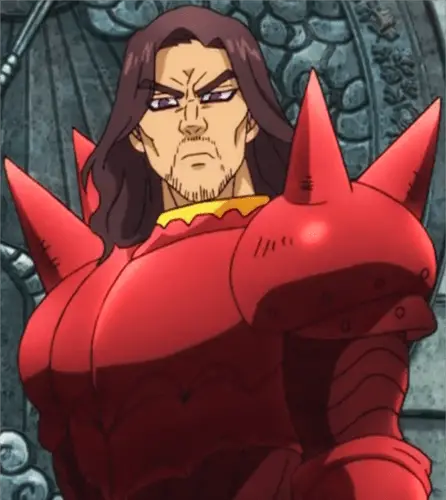Seven Deadly Sins: Dreyfus (ESTJ)

We’re aware that Dreyfus was being controlled by a demon for a very long time. However, the demon does state that he had to act like Dreyfus in order to keep up the act, and Dreyfus’s personality doesn’t seem to change pre and post possession so we’re going to treat it all as viable evidence.
Te:
“Magical power emanates from one’s own indomitable will, mind and experiences. I shall annihilate all those who would thwart the realization of my ideals and forge onward.”
“Even now, you don’t yield an inch. Your courage during this fight is commendable. You are truly an opponent worthy of us.”
Dreyfus has a commanding presence. At the beginning of the series, he is the Grand Master of the Holy Knights, a role which he easily fills. This is also a role that he takes very seriously making sure to fulfill his duties to the best of his ability.
As a Te dominant, Dreyfus is both assertive, critical and unafraid to express his opinions. For instance, he yells at a couple for going on a date due to the dangerous times. In addition, when he believes Hendrickson is reacting foolishly to a member from the Goddess race taking over Margaret’s body, he physically drags him out of the room and rebukes him for it. Dreyfus is overall very critical and suspicious of the Goddess race from the moment they show up.
When younger, Dreyfus expresses a desire for power, to become the strongest holy knight and a source of pride for his son. The desire for power is common for Te users. He also claims that he’ll annihilate anyone who gets in the way of his goals, which shows Te goal orientation – the desire to reach the goal no matter what it takes. In addition, he openly judges those that he’s in battle with, measuring their capability as an opponent. He is impressed by those who show strength both physical and strength of character. This is common for Te users, since they tend to value external capabilities.
Si:
Dreyfus values experience, which he expresses when explaining where magical power emanates from. This is common for Si users, who see past experience as very important for informing the future. He is bothered by not knowing things, and immediately begins to look into whether or not they had actually kidnapped Elizabeth once he is accused of it. He also asks Howzer why Howzer is hesitating to fight Diane. Of course, it doesn’t make him yield to Howzer’s wishes, but he generally wants clarity on what is going on around him.
As many high Si users, Dreyfus is angered by recklessness. He’s shown berating his brother for this later. He is also called overly conservative by Hendrickson, which is a common perspective that people have in regards to high Si users. His Si also comes out in the way that he deals with Hendrickson when they were joint Grand Masters. He sends Gilthunder to investigate and keep tabs on Hendrickson’s faction, desiring information so as to not be blind-sided by Hendrickson’s plans.
Ne:
“Where in the world did she go? I hope she’s not lying somewhere hurt.”
Dreyfus’ Ne is shown in how he considers multiple outcomes and generally speculates. When Hendrickson is unable to see the point of the Holy Knight’s existence, Dreyfus begins listing off other potential reasons. He’s also shown speculating about the creation of the cave that he and Hendrickson discovered. He eventually draws it back to being beyond human understanding. Of course, his Ne can lead him to making speculative jumps provoking worry, like wondering if someone is lying hurt somewhere when there’s no real evidence to suggest that fact.
You can also see his Ne in the way that he talks out and narrates his conclusions. We see him do this throughout the show. He uses talking out loud to others or himself as a means to work through both the different possibilities and what makes sense. While Ne users do not always do this, it is fairly common for those with Te-Ne to do it.
Fi:
“That’s right. I’m not inferior. I’ll surpass him one day and become grand master.”
Dreyfus’ inferior Fi is demonstrated by his fear of inferiority and general distaste for displaying weakness. He fears being seen as inferior to his brother, and gets overly excited when Meliodas’ validates his abilities, by suggesting that he could one day surpass his brother. However, in a different instance, when Hendrickson calls him “idealistic”, Dreyfus appears to get visibly upset, not wanting to be viewed in that way.
His Fi also shows up after he is finally freed from being possessed. He is very critical of himself and appeals to the King to be punished as severely as possible for his actions. He views the whole experience in a similar fashion as someone who may have squashed their Fi and stepped over a line would have. Not realizing the horrific breach to their own ideals until after the damage was done. Lastly, his desire to be a source of pride for his son can also be seen as a manifestation of his Fi.
Hi there, reader! If you enjoyed that article, leave us a quick comment to encourage us to keep writing. In addition, if you've found our content helpful in some way, please consider Buying Us A Coffee to support our efforts and help keep this website running. Thank you!
